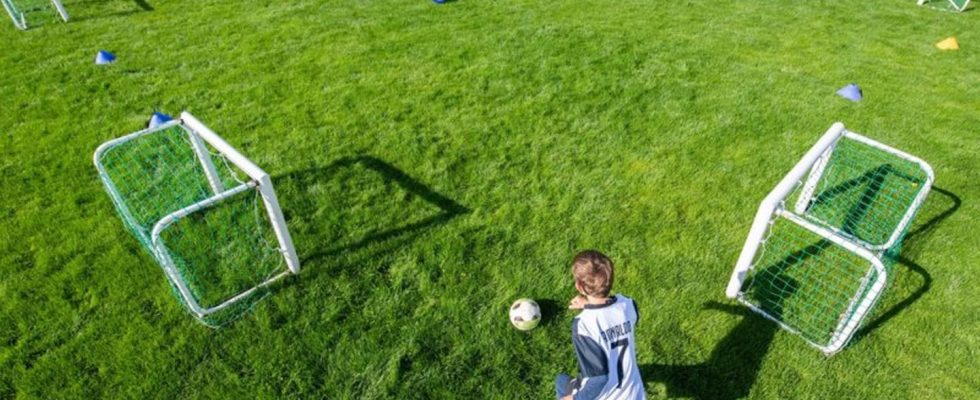Hans-Joachim Watzke is not alone in criticizing the youth reform. Fathers and mothers also have concerns. The DFB says: The competitive character remains – even if some things have to change.
At the end of his fierce criticism of the allegedly “incomprehensible” youth reform, Hans-Joachim Watzke even became cynical. “Soon we’ll play without the ball. Or we’ll make it square so that it doesn’t run away from the slightly slower young people.”
The DFB Vice President, of all people, had damaged the image of the German Football Association’s long-term project in a relaxed, conversational tone at a business meeting in Essen. And the new DFB director Hannes Wolf made it even more difficult to get support for the controversial program.
Since his appointment as Director of Young Talent, Training and Development at the end of August, Wolf has fought tirelessly and eloquently against resistance and concerns. The reform was passed unanimously by the DFB Federal Youth Day in 2022 after a pilot phase lasting several years. There will be no going back or a hasty reform of the reform, as Watzke announced without further ado.
Changes are necessary
The current crisis in German football with the embarrassing World Cup performances for men and women as well as the U21 European Championship debacle should actually clearly show the need for changes, says Wolf. “We can’t believe that just because we are a football country and were once good in certain areas, we can leave it like that,” he recently said on the talk show “Doppelpass” on the TV channel Sport1. Almost everyone agrees on this point – but why is there so much skepticism about the reform?
One point in particular is cause for criticism from many football greats, but also for concerns from numerous fathers and mothers: From the 2024/25 season, new forms of play are to be mandatory in the U6 to U11 age groups, which provide for smaller team sizes on smaller playing fields and which replace previous competitive offers as fixed formats. No results plus no tables equals no performance thought. At least this is the calculation made by former European champion Thomas Helmer, for whom the reform is “grotesque”. Former national player Dietmar Hamann also believes the step is wrong: “For me: No result, no experience.”
For U21 national coach Antonio Di Salvo, such statements are partly polemical. “Anyone who says things like that hasn’t thought 100 percent about the matter,” he said. The competitive character is by no means gone: “There used to be tables, now you move from left field to right field.” Wolf likes to cite the 3 vs. 3 game as an example, where only the winning team can move up one space.
Here, “performance is required” and the children have “direct feedback as to whether they win or lose”. But even more important: they have “actions that are relevant to football all the time.” Tackles, dribbling, offering, running free, passing, shooting on goal.
“If you do this regularly,” promises Wolf, “it will change everything.” Also in terms of winning mentality. Everyone can see “how sharp it is, how it hurts, how it burns.” This has an impact on the sporting, physical, “but also extremely on the mental level,” says Wolf: “Where you definitely don’t learn the winning mentality is when you’re standing in line during goal-scoring training.”
Looking abroad
The DFB argues that England and Belgium have had very good experiences with similar formats. When the U11 coach of Hertha BSC tells him that he sees “a different sport” in duels against English teams, it is significant, Wolf states: “When the English play 2 against 2 until they are 10 years old, and We play 6 against 6, then each of them has dribbled ten times as much as one of us.”
Jamal Musiala is the prime example of the DFB. He is without a doubt an exceptional talent, although he was largely trained in England. The Bayern professional says in comparison: “In Germany there is a league system for under ten-year-olds, whereas in England it is not common up to the U18s. There you have a lot less pressure and more time to develop, you can play much more freely .”
More football-specific actions, less tactics and opponent orientation – these are the core goals of the reform in children. The tactics board should be “banned up to the U14 level. As a father, I want my son to gamble all the time. At the end of the day, the table doesn’t really matter,” says ex-professional and U20 assistant coach Sandro Wagner, who tells the DFB – Competence team under Wolf’s leadership as well as Hermann Gerland. The experienced youth coach also promotes the new forms of play, which are not really new inventions: “Lots of ball contact, simple rules, goals close together – there is nothing nicer for a child.”
If it weren’t for the adults. Wolf complains that the information and illustrative videos on the topic on the DFB website are not yet sufficiently accessible to the approximately 24,000 football clubs in Germany.
For Horst Hrubesch, this is also a failure on the part of the association. “There are a lot of smart people working at the DFB who understand something about the subject – but once again they haven’t managed to get the clubs on board so that there is broad support for it,” said the former U21 national coach and current head of the Hamburg youth development center SV, the “Süddeutsche Zeitung”. One thing is clear to Wolf: “It will only be good if it is implemented stringently.” Statements like those made by Watzke are certainly of little help.

